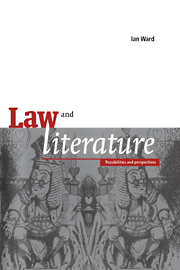Book contents
- Frontmatter
- Contents
- Preface
- PART I POSSIBILITIES
- PART II PERSPECTIVES
- 4 Shakespeare revisited
- 5 Children's literature and legal ideology
- 6 Law, literature and feminism
- 7 Law and justice in the modern novel: the concept of responsibility
- PART III TWO STUDIES IN CONTEMPORARY LITERATURE
- Notes
- Bibliography
- Index
6 - Law, literature and feminism
Published online by Cambridge University Press: 29 September 2009
- Frontmatter
- Contents
- Preface
- PART I POSSIBILITIES
- PART II PERSPECTIVES
- 4 Shakespeare revisited
- 5 Children's literature and legal ideology
- 6 Law, literature and feminism
- 7 Law and justice in the modern novel: the concept of responsibility
- PART III TWO STUDIES IN CONTEMPORARY LITERATURE
- Notes
- Bibliography
- Index
Summary
We lived in the gaps between the stories.
FEMINIST LITERARY CRITICISM: AN OVERVIEW
Feminist literary criticism, like law and literature, is not new, but it has in recent years emerged as one of the most active and vigorous areas of literary scholarship. Moreover, not only does it share with law and literature this same contemporary vigour, but feminist literary criticism also enjoys essentially the same ambitions: to educate and then to reveal the politics of literature. The two are inherently complementary. Over the last two decades, feminist literary criticism has taken two principal directions, first towards what is commonly referred to as the ‘Anglo-American’ position, which has emphasised the socio-political nature of literature, and secondly towards the ‘French’ position, which has concentrated on the construction of feminist texts as texts, or ècriture feminine. According to Mary Eagleton, Anglo-American feminists perceive the socially and politically situated woman, whilst the French feminists perceive the woman as a form of writing. Thus, whilst the latter want feminist writing to unsettle, the former want women in the public arena and in the constitutional courts. To some extent there is, once more, a certain congruence with law and literature. One direction has pursued the nature of language and language use, whilst another has sought to highlight the politics of language within texts. One of the most important differences, however, is that the two trends in feminist literary criticism have often appeared to vie with one another rather than to work as complementary forces.
- Type
- Chapter
- Information
- Law and LiteraturePossibilities and Perspectives, pp. 119 - 141Publisher: Cambridge University PressPrint publication year: 1995



